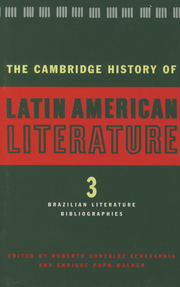Book contents
- Frontmatter
- Introduction to Volume 3
- 1 The literary historiography of Brazil
- 2 Colonial Brazilian literature
- 3 Brazilian poetry from the 1830s to the 1880s
- 4 Brazilian poetry from 1878 to 1902
- 5 The Brazilian theatre up to 1900
- 6 Brazilian fiction from 1800 to 1855
- 7 The Brazilian novel from 1850 to 1900
- 8 Brazilian fiction from 1900 to 1945
- 9 Brazilian prose from 1940 to 1980
- 10 The Brazilian short story
- 11 Brazilian poetry from 1900 to 1922
- 12 Brazilian poetry from Modernism to the 1990s
- 13 The Brazilian theatre in the twentieth century
- 14 Brazilian popular literature (the literatura de cordel)
- 15 Literary criticism in Brazil
- 16 The essay: architects of Brazilian national identity
- 17 The Brazilian and the Spanish American literary traditions: a contrastive view
- Bibliography
- Index
- References
9 - Brazilian prose from 1940 to 1980
Published online by Cambridge University Press: 28 March 2008
- Frontmatter
- Introduction to Volume 3
- 1 The literary historiography of Brazil
- 2 Colonial Brazilian literature
- 3 Brazilian poetry from the 1830s to the 1880s
- 4 Brazilian poetry from 1878 to 1902
- 5 The Brazilian theatre up to 1900
- 6 Brazilian fiction from 1800 to 1855
- 7 The Brazilian novel from 1850 to 1900
- 8 Brazilian fiction from 1900 to 1945
- 9 Brazilian prose from 1940 to 1980
- 10 The Brazilian short story
- 11 Brazilian poetry from 1900 to 1922
- 12 Brazilian poetry from Modernism to the 1990s
- 13 The Brazilian theatre in the twentieth century
- 14 Brazilian popular literature (the literatura de cordel)
- 15 Literary criticism in Brazil
- 16 The essay: architects of Brazilian national identity
- 17 The Brazilian and the Spanish American literary traditions: a contrastive view
- Bibliography
- Index
- References
Summary
Any pattern which the literary historian discerns in the last half-century of Brazilian prose-writing is bound to be somewhat speculative and imposed on a very heterogeneous mass of material, but three conclusions at least seem inescapable, and can act as preliminary markers.
First, no-one can doubt that the political events of the 1960s and 1970s – the military coup of 1964, the ensuing repression, and censorship (gradually removed in the 1970s) – had a profound effect on the manner of, and the subject-matter tackled by, many writers. Perhaps it would be truer to say that the whole period, one of widespread and often traumatic change in all spheres, not simply political, changed the whole climate in which authors wrote. On the most immediate level, writers had to battle with censors: if, like Antônio Callado (b. 1917), they had already established a reputation, this could mean a cat-and-mouse game of novels printed then impounded, then allowed again (as happened with Bar Don Juan, his novel about middle-class guerrillas); in other cases, like that of Zero by Ignácio de Loyola Brandão (b. 1936) it could mean banning and even publication abroad (though for obvious reasons this was not such a frequent outlet as is the case in Spanish America). More important than such dramatic “cases,” censorship also meant a general clamp-down and curtailing of possibilities. On a deeper level, the imposed silence, and the events of the 1960s themselves, produced the sensation that nothing could, or should, be the same again: when censorship was lifted, fiction looked very different. There was a spate of novels and stories, hardly removed from documentaries, which tried to tell “the real story,” and some of these achieved an immense popularity, leading to what was described as a kind of Brazilian "Boom," very different, however, from its Spanish American model.
- Type
- Chapter
- Information
- The Cambridge History of Latin American Literature , pp. 189 - 206Publisher: Cambridge University PressPrint publication year: 1996
References
- 1
- Cited by

